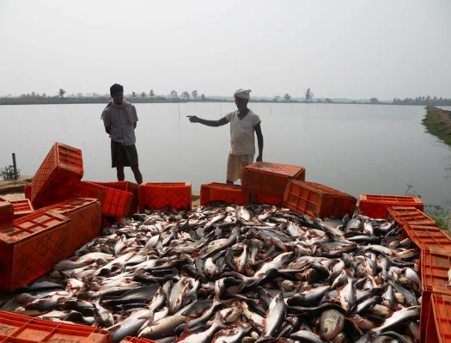Despite its extensive coastline spanning nearly 1,000 kilometers and the opportunity for fishing within the Exclusive Economic Zone (EEZ) up to 200 nautical miles, Andhra Pradesh faces a significant challenge in establishing a reliable and robust domestic market for its abundant seafood products. In response, the state government has devised a comprehensive marketing strategy that encompasses seafood festivals and the establishment of branded retail outlets, aiming to transform the dynamics of the seafood industry.
According to VV Rao, Joint Director of the Fisheries Department, the absence of a strong domestic market has left aquaculture entrepreneurs, particularly those involved in shrimp farming, at the mercy of a “buyer’s market.” To tackle this issue, the Fisheries Department is partnering with Bhoomi Organics to organize seafood festivals. These festivals are envisioned to promote seafood consumption, stimulate demand, and connect entrepreneurs with consumers.
Rao emphasized the abundance of marine fish, natural water bodies, and shrimp production in Andhra Pradesh. The state boasts 5.75 lakh tonnes of marine fish, 4.75 lakh hectares of natural water bodies (including reservoirs, lakes, and ponds), and up to 20 lakh tonnes of cultured shrimp, resulting in an annual production of 52 lakh tonnes of fish, shrimp, and aquaculture products from various sources.
Despite being a major exporter of shrimp, with approximately 15 lakh tonnes shipped abroad, Andhra Pradesh consumes only three to four lakh tonnes of shrimp locally. This export-oriented approach raises concerns about the sustainability and profitability of aquaculture entrepreneurs within the state. To counter this trend, the government seeks to boost local consumption of seafood.
With mutton prices soaring to ₹1,000 per kilogram and concerns surrounding poultry, Rao sees seafood as a natural, nutritious, and affordable alternative. He highlighted the health benefits of seafood, which is rich in nutrients and available for as low as ₹50.
Raghuram from Bhoomi Organics stressed that the term “organic food” extends beyond groceries and plant-based products to include anything free of chemicals. He argued that fish from the sea and natural water bodies qualify as organic, as they rely on a natural food chain, beginning with plankton and aquatic organisms.
He also raised concerns about hormones in chicken and milk, which he believes contribute to hormonal imbalances and health issues such as polycystic ovarian disease (PCOD).
Fisheries Commissioner K Kanna Babu reported that seafood festivals have already gained traction, with thousands of food enthusiasts relishing unlimited seafood buffets priced at ₹699 per head. These festivals have attracted substantial footfall, and plans are underway to host them in various locations across the state.
Additionally, the government is actively establishing “Fish Andhra” retail outlets under a hub-and-spoke model. Currently, three are operational, and 15 are under construction out of a total of 26 hubs. The goal is to increase the number of retail outlets from 2,000 to 4,000 by March next year. These outlets will offer online ordering options and provide seafood in live and packaged formats. Entrepreneurs can benefit from generous subsidy schemes, training, and guidance to set up their outlets.
Despite these endeavors, Commissioner Babu acknowledged that there is still much work to be done. While non-vegetarian cuisine enjoys immense popularity in Andhra Pradesh, the average seafood consumption per person per annum stands at less than 8 kilograms, signaling an untapped domestic market.
He also emphasized the importance of not leaving entrepreneurs at the mercy of international markets and the need to foster a thriving domestic seafood industry.

